Exeter Plasterers: Whether you have a small plastering task or a sizeable plastering project to be carried out on your home in Exeter, you will need a seasoned and professional plasterer to manage the work in a proper and correct manner. It is not advisable to attempt plastering yourself, since it is a craft that takes many years to master.
A certain amount of plastering can be generated by even the most basic home remodeling projects. It might be things like plastering over an old artexed ceiling, plaster repair before tiling, fitting mouldings or coving before decorating or skimming a dry lined partition. Do not however imagine that those are the only plastering, rendering and screeding tasks that might be necessary, since there are lot's more possibilities.
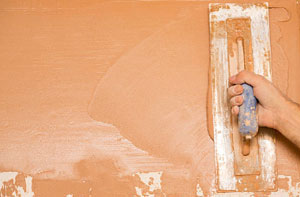
Using a plasterer who knows what they're doing is the most important issue, so ask potential Exeter plasterers to show you a portfolio of their accomplished projects. For this type of work, you want to avoid using "cowboys", without exceptions. You may encounter big complications later on if the quality of the plastering is poor, and these are not often immediately noticeable.
Once you start decorating, the defects will begin to show up. Even more so, with the sun shining onto the newly plastered areas. There are plenty of good plasterers in Exeter, so make sure you track down a competent one.
Smooth and flat are the main attributes of a plastered surface, because other materials or products will subsequently be applied to it. It is quite simple to fill and repair any negligible blemishes and cracks, however it's tricky to hide fundamentally uneven plaster. An imperfectly plastered surface will cause severe problems with the decorating of walls and ceilings, the tiling of wall surfaces, the fitting of skirting boards and the fitting of kitchen units.

You should expect nothing less than a polished finish directly from the trowel. Ceilings and walls which have been plastered by a specialist, should never need to be sanded down. If your finished plastering needs forceful sanding, you know that it hasn't been done correctly. You should check out the quality of the plastering thoroughly, if you see electric sanding machines being employed.
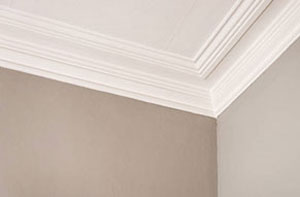
A common reason for calling in a plasterer nowadays, is to plaster over an old artexed ceiling. During the 1970's and 1980's, artex was the "in" finish for ceilings in Exeter, currently that is not the case. Most plasterers in Exeter will be happy to plaster over that old artexed ceiling, making it look more sleek and modern. Plastering over artex is preferred to removing it as it is quite difficult to take off or repair, which is no doubt why its popularity waned in the first place.
Do-it-Yourself Plastering Exeter: While it is usually better to hire an experienced plasterer in Exeter when you have plastering work that needs to be undertaken in your home or business premises, it is quite possible to have a go at doing it yourself if you're reasonably good at DIY, and have the self-belief to attempt it. As a rookie plasterer it's advisable to commence your plastering journey by perhaps doing a test run on an out-of-sight area or a spare bedroom, particularly one that's already got a poorly plastered surface and that cannot be made worse by your amateur efforts. This will enable you to test out your newly acquired skills and is going to be less stressful than trying to do a wall surface that everybody in the house can see. Within reason, it's possible for you to re-skim a wall surface as many times as you wish, consequently if you make a bodge up of it to begin with, you can simply re-do it as your expertise improves.
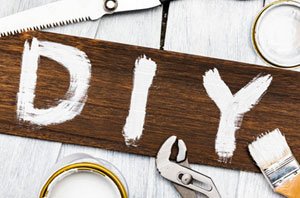
You should be able to get some good plastering tips by watching and studying YouTube tutorials on the internet if you do not wish to go to the extreme length of signing up for a plastering course. The difficulty is that videos can frequently make it look simple, and plastering is actually quite tricky. Practice makes perfect as they say, and plastering is certainly no exception to this rule - so the more you practice the more adept and more confident you become. By using experimentation you may even develop you own solutions for getting that perfect finish. But if you are in doubt, follow the tried and proven methods. Because plastering is mainly about confidence, the more often you do it, the more confident you'll get. You can tackle some more elaborate plastering projects when you have mastered this art to a good standard. You've still got the option of hiring an experienced Exeter plasterer if you mess it up.
Plastering companies can be found in the Exeter area, as well as in: Alphington, Ide, Whitestone, Birchy Barton, Stoke Hill, Poltimore, Exwick, Wonford, Longdown, Nadderwater, Heavitree, Exminster, Pocombe Bridge, Whipton, Cowley, Marsh Barton, St Thomas, in addition to places with postcodes like: EX1 2AT, EX1 1PD, EX1 1LB, EX1 1BU, EX1 2BL, EX1 1DY, EX1 1AN, EX1 1TU, EX1 1JG, and EX1 1QU. Local Exeter plasterers will most likely have the postcode EX1 and the dialling code 01392. You can just click the "QUOTE" form or banner to get more information about plastering in the local area.
Pebble Dashing

A product that is frequently used to protect and enhance the outsides of houses, pebbledash is not everybody's cup of tea in Exeter. Plasterers will often do this sort of work for you, however there are pebbledashing experts available. Suitable for both new and renovated properties, pebble dash typically consists of a couple of layers of a base made from lime and sand onto which small gravel or pebbles are pressed to create a decorative, maintenance free and robust finish. (Tags: Pebble Dashing Exeter, Pebble Dashers Exeter, Pebble Dash Exeter, Pebble Dash Removal Exeter)
Plastering Courses Exeter

The ultimate way to either master the basics of the art of plastering or to acquire the essential skills and knowledge to kick start a career in plastering is to enroll in an appropriate course at a local training centre or college. There are a range of plastering related courses on offer for both individuals looking to advance their plastering expertise and for beginners just starting out. There are advanced and beginner plastering courses offered in either City and Guilds or NVQ. Beginners plastering courses (level 1) cover things like putting on floating coats (wall surfaces), making ready background surfaces, fixing sheet materials, mixing up plaster products, applying scratch coats (walls) and putting on set coats (to walls). Advanced (level 2 courses and diplomas) deal with such things as fibrous plastering, plastering to external backgrounds, dry lining, sand and cement screeding and reverse moulding for fibrous work. For plastering courses in Exeter and across Devon, do a quick search on Google or Yahoo. You are able to learn about five day intensive plastering courses by heading here.
What is Plaster?
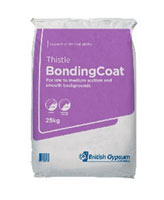
A frequently used building material which is used for protecting and decorating wall and ceiling surfaces, plaster has been around for many centuries. The term "plaster" ordinarily refers to the material that is utilized on the interiors of homes in Great Britain. The material which is used for on external areas is termed "render". Plaster mixes typically contain either gypsum, cement, or lime, all of which work in fairly similar ways. A fine, dry powder at the time of manufacture, as needed plaster is combined with water to form a stiff, easy to work paste. The combining of the plaster powder and water causes a reaction, and heat is produced through crystallization, making the resulting paste set and harden.
Exeter Plaster Patching
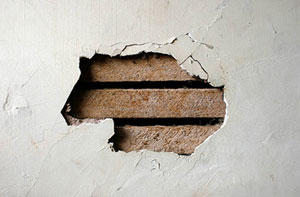
Damaged or cracked plasterwork is a common issue, particularly with older properties in Exeter or those which have recently undergone construction work or home improvements. As the plasterwork is a key element of your wall surface, you have to keep it in good shape so it can be decorated and kept neat. There is little worse than seeing cracked plaster walls, or areas that are messy or hastily patched up with Polyfilla. This kind of task is simple for any experienced Exeter plasterer, and your plastered walls should soon be looking pristine and ready for painting and decorating. Your plaster walls can be impacted by a lot of different problems, with vibration, shrinkage, settlement, damp and accidental damage being among the more common causes. If there's an underlying situation, you'll need to sort that out before doing any patching, if you don't the issue will almost certainly return.
Polished Plaster Exeter
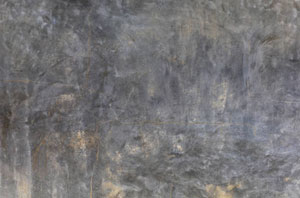
Polished plaster is a regular term for the surface finish of several plasters and for the classification of modern styles of traditional Italian plaster finishes. Covering anything from rugged looking textured plasters to very highly polished Marmorino, Lucidato and Venetian plasters, the term "Polished Plaster" actually covers a variety of premium plaster finishes. Polished plaster is generally used on interior walls and ceilings, to give a surface finish that looks like polished travertine, limestone or marble. Polished plaster offers natural shade variations giving a sense of depth whilst still being smooth when touched. Also, it is possible to combine these kinds of plasters to obtain exclusive bespoke finishes. Polished plaster can be coloured or dyed using natural or synthetic colourants. If you want to create a "marbled" effect in your polished plaster, or completely unique designs or colours that don't exist naturally, the capability to add tinting to Venetian plaster is especially helpful. (Tags: Polished Plastering Exeter, Venetian Plaster Exeter, Marbled Plaster Exeter, Polished Plaster Exeter)
Rendering
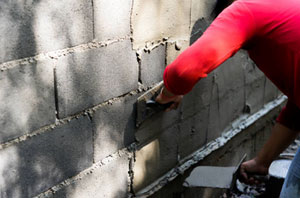
Rendering is a similar technique to plastering, and is the process by which a mix of lime, cement, sand and water is applied to external (and sometimes interior) walls in order to achieve a smooth or textured surface finish. Rendering is really common in the Mediterranean countries, but is also popular all around Europe. A rendered surface is mainly used for aesthetic purposes but is also waterproof and has some useful fire resisting properties. You can obtain a longer lasting and more resilient result by adding colour to the render itself, even though of course it is possible to paint a rendered wall. (Tags: Renderers Exeter, Rendering Exeter)
Decorative Plastering Exeter
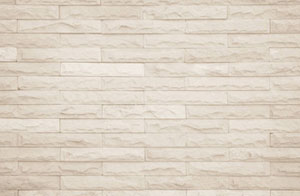
Plastering is certainly not a modern day invention and was being done by the ancient Greeks, Romans and Egyptians thousands of years ago. The substances used would of course have been different in those long past days, when concoctions of both clay and mud were employed. A type of plaster was put on the interior walls of shops and buildings in 13th century London to limit the spread of fires. As you will notice if you go to visit buildings of this period, elaborate gypsum features and mouldings were extensively produced in Victorian and Georgian times. In these modern times, specialist plasterers can deliver incredible decorative plaster effects by the use of age-old techniques coupled with modern materials. This could include the application of brackets, niches, cornice finishes, corbels, coving, ceiling roses and dentils.
Screeding
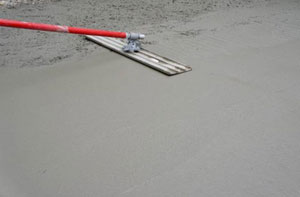
Some plasterers in Devon will also provide a floor screeding service, by which a smooth, level floor surface is formed by the use of a cement and sand mix. Mostly screeding is applied on top of a concrete sub-floor to cover underfloor heating pipes, to be left as a wearing floor surface or to take on the final floor finish. This can help to increase the lifespan of a floor and ensure its durability, finish and quality, for several years. A proper screed pump should be used to swiftly produce a smooth, even mixture of cement and sand and to transport (pump) this perfect mix directly to where its needed, avoiding the use of wheelbarrows and other equipment. The mixing of screed by hand should only be used where smaller areas are involved. There are different types of floor screeding available in Exeter, therefore you should ask around about which is appropriate for your particular project, you will need to pick from unbonded screed, structural screed, floor levelling compound, bonded screed, traditional screed, free-flowing screed and fast drying screed.
Artex
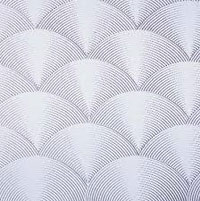
Although most common during the Seventies and Eighties artex still is a good way to enhance the look of a ceiling, in particular a cracked or shabby one. Back in the day, there were so many people carrying out artexing it was simple to find someone offering this service in Exeter. Nowadays however, tracking down a plasterer who does artexing is not quite as straightforward. With designs like broken leather, stippled, circle, pairs, swirl, basket & roses, hook & line, medusa, bark, scroll or criss-cross, there appeared to be something for everyone. There was an artex pattern to suit, irrespective of your taste. All of these artex patterns can still be achieved today if you're able to find a local artexer or plumber prepared to do it. Avoid handyman type people who will just "have a go". The main pitfall with artex, and what probably triggered its fall in popularity, is it is difficult to patch or repair. (Tags: Artex Removal Exeter, Artex Exeter, Artexing Exeter, Artex Patching Exeter, Artex Repairs Exeter)
Plastering Tasks Exeter

Exeter plastering specialists can usually help with exterior rendering and screeding, pitted plastering, plastering archways, Venetian polish plastering Exeter, monocouche rendering, ceramic tiling, artex removal and repair, chamois plastering in Exeter, dragged plastering, fibrous plastering, cornices and ceiling roses Exeter, skimming over brickwork, ceiling repairs Exeter, pebble dash repairs, stucco plastering, plaster patching in Exeter, plasterboard skimming, soundproofing in Exeter, lime rendering, lay in grid suspended ceilings, the rendering of breeze blocks, plastering restoration, artex testing in Exeter, overskimming plaster walls and ceilings in Exeter, plastering over artex, Marmorino plastering, rendering with sand and cement in Exeter, hard walling, magnetic plastering in Exeter, the plastering of archways, insurance work, rapid setting screeds, bonding, sculptured coving, floor levelling and screeding and other plastering work in Exeter, Devon. Listed are just a handful of the tasks that are accomplished by local plasterers. Exeter providers will be happy to inform you of their full range of services.
Information, Help and Social Media

Visit the Federation of Plastering and Drywall Contractors website to track down certified plasterers. For more information about exterior plastering techniques, traditional plasterer's techniques, plastering tools and materials, plasterer's tasks, the history of plastering and plaster and interior plastering, head to the Wikipedia page (HERE). To ask questions pertaining to plastering, screeding and rendering visit the Plasterer's Forum (here). Topics of discussion comprise Tricks and Tips of the Trade, Damp and Damp Proofing, Plastering Students Discussions, Fibrous Plastering, Rendering, Exterior Wall Insulation, Magnetic Plastering, General Trade Discussions, Plasterer's Health and Safety and Floor Screeding. (Tags: Plasterer Exeter, Plasterers Devon, Plastering Exeter, Plasterers Exeter).
Plasterers Near Exeter
Also find: Exminster plasterers, Cowley plasterers, Whipton plasterers, Stoke Hill plasterers, Heavitree plasterers, Pocombe Bridge plasterers, Birchy Barton plasterers, Exwick plasterers, Poltimore plasterers, Whitestone plasterers, Ide plasterers, St Thomas plasterers, Longdown plasterers, Alphington plasterers, Marsh Barton plasterers, Nadderwater plasterers, Wonford plasterers and more. All these areas are served by local plastering contractors. Householders in these localities can get plastering quotes by simply clicking here.
Exeter Plastering Services
- Exeter Commercial Plastering
- Exeter Artexing
- Exeter Float and Set
- Exeter Plasterboarding
- Exeter Plaster Skimming
- Exeter Plasterers
- Exeter Cornice Installation
- Exeter Plaster Repairs
- Exeter Domestic Plastering
- Exeter Plaster Patching
- Exeter Latex Screeding
- Exeter Plastering Courses
- Exeter Coving Installation
- Exeter Ceiling Replacements
Other Useful Trades in Exeter Devon

Undoubtedly, when you're doing home renovations in Exeter, Devon, you will probably be in need of all sorts of different tradesmen and aside from a plasterer in Exeter, Devon, you could additionally need builders in Exeter, artexers in Exeter, dry lining in Exeter, dry liners in Exeter, painters and decorators in Exeter, pebble dashers in Exeter, coving fitters in Exeter, renderers in Exeter, electricians in Exeter, screeding in Exeter, domestic & commercial cleaners in Exeter, waste removal in Exeter, carpenters in Exeter, external wall insulation in Exeter, decorative cornicing in Exeter, and other different Exeter tradesmen.
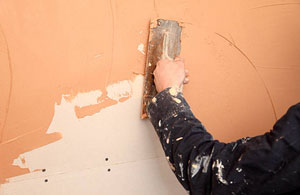 Plasterers Exeter
Plasterers Exeter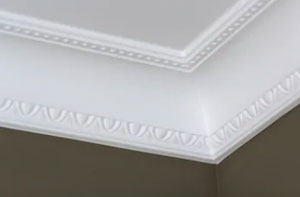 Plastering Near Me
Plastering Near Me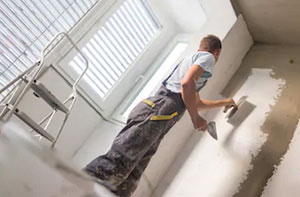 Plasterer Exeter
Plasterer ExeterIf you would like to get local Exeter information go here
Plastering Jobs Exeter: Browse plastering jobs in Exeter here: Plastering Jobs Exeter
More: Plaster Patching, Cheap Plasterers, Plaster Repair, Patch Plastering, Plastering Specialists, Residential Plastering, Patch Plastering, Plasterers, Plastering Repair, Plaster Patching, Plaster Repair, Plastering Contractors, Commercial Plastering, Plastering Repairs, Plastering Repairs, Domestic Plastering, Domestic Plastering, Residential Plastering, Cheap Plasterers, Plastering Repairs, Commercial Plastering, Commercial Plastering, Plaster Patching, Plastering Services, Plastering, Residential Plastering, Plastering Specialists, Residential Plastering, Domestic Plastering, Internal Plastering.
Plasterers in EX1 area, (dialling code 01392).
Cheap Plasterer Exeter - Plasterer Exeter - Plastering Exeter - Plasterers Exeter - Rendering Exeter - Screeding Exeter - Plasterboarding Exeter - Plaster Repairs Exeter - Artexing Exeter





